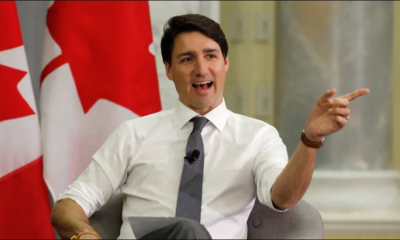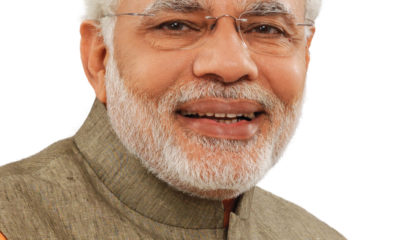World
Obama planning to ‘invade’ Texas?

Washington: American politics can sometimes border on the bizarre. Conspiracy theorists would have one believe that Democratic President Barack Obama is hatching a secret plot to invade the Republican-ruled southern American state of Texas and impose martial law?
Rumours gained traction after Texas Governor Greg Abbott vowing to “protect Texas” ordered the state militia to monitor a Pentagon training exercise called Operation Jade Helm 15 to be conducted this summer in five states, including Texas and Arizona.
Obama’s 2008 Republican presidential candidate John McCain, the Senate Armed Services Chairman, Monday mocked Abbott’s order as “bizarre” joining other politicians of both hues who see unfounded paranoia in concerns of impending martial law.
“We have been having military exercises in the southwest for a couple of hundred years,” noted McCain.
Laughing off Abbott’s decision, he sarcastically warned the military to leave his home state of Arizona alone as well. “I’m sure the people of Texas feel much more secure,” joked McCain.
While the Pentagon insists the states were picked because they have similar terrain to certain foreign countries, conspiracy theorists claim the mission might be the first step toward martial law or another rogue military action, according to Dallas Morning News.
Former Texas Governor Rick Perry has criticized Abbott for questioning the military, while House Armed Services committee’s Republican chairman Mac Thornberry, called concerns “silly.”
The Pentagon noting that war games are routinely conducted on American soil, has described the planned eight week operation as a “realistic military training exercise” and there is nothing menacing about Jade Helm.
But conspiracy theorists have sparked rumours that Obama is preparing to confiscate firearms, impose martial law, or even forcibly relocate citizens to FEMA internment camps, according to the Hill, a news site focusing on Congressional affairs.
Right-wing bloggers seized on the exercise, noting that the Army’s own statement said, “the size and scope of Jade Helm sets this one apart.”
A map created for the simulated war games labeling parts of Republican states Texas and Utah as “hostile” areas and New Mexico as “uncertain (leaning hostile)” went viral, leading to theories Obama is cracking down on the West, the Hill reported.
A parallel theory suggested that closed Wal-Mart stores were being used to stage the operation, leading the retail giant to issue an official denial to Talking Points Memo.
“There is no truth to the rumors,” a Wal-Mart spokesman told the website.
Abbott defended his move, saying it would inform the public, only to be met with a chorus of criticism with a former Republican state lawmaker saying Abbott was “pandering to idiots.”
Asked at a press conference last week if the military was “planning to overtake Texas,” Defence Secretary Ash Carter flatly replied “no” to laughter.
White House press secretary Josh Earnest too insisted Texans are safe and “I have no idea what he’s (Abbot) thinking.”
World
Lockdowns in China Force Urban Communities to Defy Censorship and Vent Frustration Online

Shanghai’s rich middle class is leading a wave of online dissent over the strict and prolonged lockdowns imposed in various parts of the country. Chinese internet censorship is struggling as patience is wearing thin in many urban centers, coming up with creative forms of online protests.
Social Media Posts Revealing Lockdown Tension in Shanghai
Drawn-out lockdowns are nothing new in China as authorities insist with the nation’s zero-Covid policy since the start of the pandemic. Currently over This time around, however, metropolitan areas like Shanghai are increasingly difficult to keep quiet, given that its more than 25 million residents have seen weeks of total isolation along with food shortages and many other service interruptions.
Dozens of towns and reportedly over 300 million Chinese citizens have been affected by lockdowns of different severity. As expected, urban netizens have been most outspoken over their difficulties by finding creative ways to get around state censorship and bans placed on topics, news comments and spontaneous campaigns.
Shanghai residents have been using mobile proxies and hijacking seemingly unrelated hashtags to talk about healthcare issues, delivery failures and the overall severity of their situation. The “positive energy” that the Chinese government wants to transmit during the recent prolonged series of lockdowns does not come naturally to those counting food supplies and online censors are working hard to filter words, trending topics and undesired social media sharing.
WeChat groups and message threads are under constant monitoring. Posts questioning the zero-Covid approach have been quickly deleted, including by leading Chinese health experts like Dr. Zhong Nanshan. Video footage is soon censored and protests and investigations are quickly made to disappear.
Where this has not worked, officials have exposed banners with warnings and outright threats like “watch your own mouth or face punishment”, while drones have been patrolling the city skies. Yet, if anything, this has led to further tensions and unspoken confrontation with Shanghai’s educated and affluent middle class.
Creative Online Solutions Harnessing Civic Energy
Announcements by Chinese social media that they would be publishing the IP addresses of users who “spread rumors” have not helped either. Tech industry research has shown that much of Asia’s tech-savvy population has a habit of using mobile proxies and other privacy tools, quickly finding workarounds to browse the internet freely and talk to the world about the hottest topics.
The sheer volume of forbidden posts is already a challenge for the very censorship system, experts explain. Unable to track all trending hashtags, state workers overlook topics that speak about the US, Ukraine or other popular news. Linking human rights elsewhere to their situation, Chinese online dissidents establish their informal channels and “hijack” the conversation to share personal or publicly relevant information about the Covid suppression in their town.
Sarcastic and satirical posts still dominate. Others hope to evade the censors by replacing words from famous poems or the national anthem. One thing is certain – social media, when harnessed with the right creativity, has proven its ability to mount pressure on the government in even some of the most strictly controlled tech environments like China.























